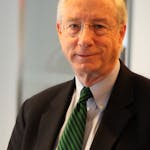
The goal of this new program, announced on Sunday, is to double access to electricity in sub-Saharan Africa, where more than two-thirds of the people now have none, including 85 percent of those living in rural areas.
Gayle Smith, Obama’s senior director for development and democracy, explained the need in more personal terms: “If you want lights so kids can study at night or you can maintain vaccines in a cold chain, you don’t have that,” she said.
The United States will commit more than $7 billion over the next five years to this effort – not in direct funding, but through other ways to encourage private investment, like long-term financing, insurance, guarantees, and technical assistance. Already companies like General Electric have stepped up with $9 billion in commitments to invest.
Michael Gerson had a terrific column in the Washington Post on the need for Power Africa. Here’s a bit:
“Women and girls have an especially hard time of it: carrying firewood for long distances on their heads or backs, cooking with stoves that produce toxic fumes, giving birth in health facilities without lighting. Energy poverty is not merely economic; it is expressed in deforestation, respiratory illness, and maternal and child mortality.”
Power Africa builds on the great leadership shown by UN Secretary-General Ban Ki-moon, who launched the Sustainable Energy for All initiative two years ago, with the objective of ensuring universal access to modern energy services – not just electricity, but clean fuels for cooking and heating – by 2030. Our longtime President and now Vice Chair, Timothy Wirth, serves on the Executive Committee.
We are proud of our work at the UN Foundation to support Sustainable Energy for All through our Energy Access Practitioner Network and the Global Alliance for Clean Cookstoves.
We believe energy is necessary for development, and sustainable energy is necessary for sustainable development. We were delighted to see sustainable energy called out as one of 12 development goals proposed by the Secretary-General’s High-level Panel on the Post-2015 Development Agenda.
The band Linkin Park has been a great partner in this endeavor with its Power the World web site and its organization Music for Relief.
And the ONE campaign, led by the singer Bono, has also become an advocate for ending energy poverty.
That’s quite a team. Together we can create economic opportunity and save millions of lives through access to modern energy.



 View All Blog Posts
View All Blog Posts